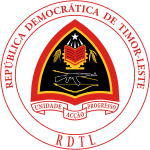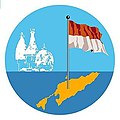
East Timor, officially the Democratic Republic of Timor-Leste, is a country in Southeast Asia and Oceania. The country comprises the eastern half of the island of Timor and the nearby islands of Atauro and Jaco. The first inhabitants are thought to be descendant of Australoid and Melanesian peoples. The Portuguese began to trade with Timor by the early 16th century and colonised it throughout the mid-century. Skirmishing with the Dutch in the region eventually resulted in an 1859 treaty for which Portugal ceded the western half of the island. Imperial Japan occupied East Timor during World War II, but Portugal resumed colonial authority after the Japanese surrender.

Bacharuddin Jusuf Habibie was an Indonesian politician and engineer who served as the third president of Indonesia from 1998 to 1999. Less than three months after his inauguration as the seventh vice president in March 1998, he succeeded Suharto, who resigned after 32 years in office. Originating from Sulawesi with Gorontalese-Javanese ancestry, his presidency was seen as a landmark and transition to the Reform era.

The International Force East Timor (INTERFET) was a multinational non-United Nations peacemaking task force, organised and led by Australia in accordance with United Nations resolutions to address the humanitarian and security crisis that took place in East Timor from 1999–2000 until the arrival of UN peacekeepers. INTERFET was commanded by an Australian military officer, Major General Peter Cosgrove.

The Armed Forces for the National Liberation of East Timor originally began as the military wing of the Fretilin party of East Timor. It was established on 20 August 1975 in response to Fretilin's political conflict with the Timorese Democratic Union (UDT).

The United Nations Mission in East Timor (UNAMET) was established by Security Council Resolution 1246 on 11 June 1999 for a period up to 31 August 1999. By Security Council Resolution 1257 of 3 August UNAMET was extended to 30 September 1999.

The Indonesian occupation of East Timor began in December 1975 and lasted until October 1999. After centuries of Portuguese colonial rule in East Timor, the 1974 Carnation Revolution in Portugal led to the decolonisation of its former colonies, creating instability in East Timor and leaving its future uncertain. After a small-scale civil war, the pro-independence Fretilin declared victory in the capital city of Dili and declared an independent East Timor on 28 November 1975.

The National Council of Maubere Resistance was an umbrella organisation of East Timorese individuals and organisations dedicated to resisting the Indonesian occupation of 1975–1999.

The 1999 East Timorese crisis began with attacks by pro-Indonesia militia groups on civilians, and expanded to general violence throughout the country, centred in the capital Dili. The violence intensified after a majority of eligible East Timorese voters voted for independence from Indonesia. Some 1,400 civilians are believed to have died. A UN-authorized force (INTERFET) consisting mainly of Australian Defence Force personnel was deployed to East Timor to establish and maintain peace.

East Timor and Indonesia established diplomatic relations in 2002. Both share the island of Timor. Indonesia invaded the former Portuguese colony in 1975 and annexed East Timor in 1976, maintaining East Timor as its 27th province until a United Nations-sponsored referendum in 1999, in which the people of East Timor chose independence. Following a United Nations interim administration, East Timor gained independence in 2002. Indonesia already had a consulate in Dili during the Portuguese colonial period, though Indonesia formalized their relations by establishing an embassy in Dili. Since October 2002, East Timor has an embassy in Jakarta and consulates in Denpasar and Kupang. Relations between the two countries are generally considered highly positive, despite various problems. Numerous agreements regulate cooperation in different areas. East Timorese are visa-free in Indonesia.
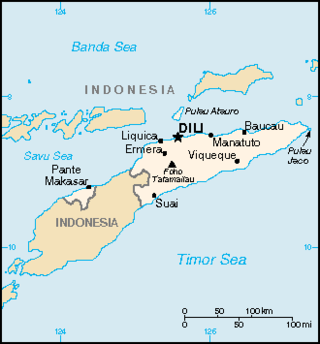
United Nations Security Council resolution 1236, adopted unanimously on 7 May 1999, after recalling previous resolutions on East Timor including 384 (1975) and 389 (1976), the Council welcomed an agreement between Indonesia and Portugal on the future of East Timor and a proposed United Nations presence to assist with the East Timor Special Autonomy Referendum scheduled for August 1999.
United Nations Security Council resolution 1246, adopted unanimously on 11 June 1999, after recalling previous resolutions on East Timor, particularly Resolution 1236 (1999), the council established the United Nations Mission in East Timor (UNAMET) to organise and conduct the East Timor Special Autonomy Referendum on the future status of East Timor, scheduled for August 1999.

United Nations Security Council resolution 1257, adopted unanimously on 3 August 1999, after recalling previous resolutions on East Timor, particularly Resolution 1246 (1999), the Council extended the mandate of the United Nations Mission in East Timor (UNAMET) until 30 September 1999.
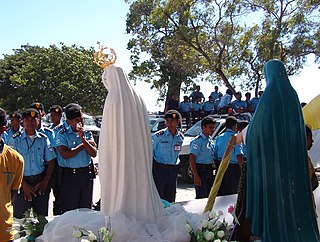
United Nations Security Council resolution 1262, adopted unanimously on 27 August 1999, after recalling previous resolutions on East Timor, particularly resolutions 1246 (1999) and 1257 (1999), the Council extended the mandate of the United Nations Mission in East Timor (UNAMET) until 30 November 1999.
United Nations Security Council resolution 1264, adopted unanimously on 15 September 1999, after recalling previous resolutions on East Timor (Timor-Leste), the Council authorised the establishment of the multinational International Force for East Timor (INTERFET) to restore peace and security in the territory, facilitate humanitarian assistance and protect the United Nations Mission in East Timor (UNAMET).
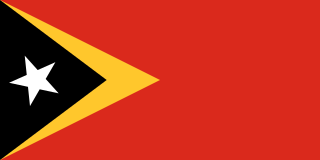
United Nations Security Council resolution 1272 was adopted unanimously on 25 October 1999, after recalling previous resolutions on East Timor, particularly resolutions 384 (1975), 389 (1976), 1236 (1999), 1246 (1999), 1262 (1999) and 1264 (1999). The council established the United Nations Transitional Administration in East Timor (UNTAET) that was responsible for the administration of the territory until its independence in 2002.

United Nations Security Council resolution 1338, adopted unanimously on 31 January 2001, after recalling previous resolutions on East Timor (Timor-Leste), particularly resolutions 1272 (1999) and 1319 (2000), the Council extended the mandate of the United Nations Transitional Administration in East Timor (UNTAET) for a year until 31 January 2002.

The Indonesia–Timor Leste Commission on Truth and Friendship was a truth commission established jointly by the governments of Indonesia and East Timor in August 2005. The commission was officially created to investigate acts of violence that occurred around the independence referendum held in East Timor in 1999 and sought to find the "conclusive truth" behind the events. After holding private hearings and document reviews, the commission handed in the final report on July 15, 2008 to the presidents of both nations, and was fully endorsed by Indonesian President Susilo Bambang Yudhoyono, providing the first acknowledgement by the government of Indonesia of the human rights violations committed by state institutions in Timor. The commission is notable for being the first modern truth commission to be bilateral.

Mário Viegas Carrascalão was an East Timorese politician and diplomat. Carrascalão, a founder of the Timorese Democratic Union (UDT) in 1974 and the Social Democratic Party (SDP) in 2000, served as the governor of East Timor from 1981 to 1992 during the Indonesian occupation of the country. However, he re-joined the East Timorese government following the 1999 independence referendum and the transition to independence. He later served as a deputy prime minister within the IV Constitutional Government of then-Prime Minister Xanana Gusmão from 2009 to 2010.

Dionísio da Costa Babo Soares is an East Timorese politician, and a member of the National Congress for Timorese Reconstruction (CNRT). From June 2018 to May 2020, he was the Minister for Foreign Affairs and Cooperation, under the VIII Constitutional Government of East Timor; he had earlier served as Minister of State, Coordinator of State Administration Affairs and Justice, Minister of State Administration, and Minister of Justice.
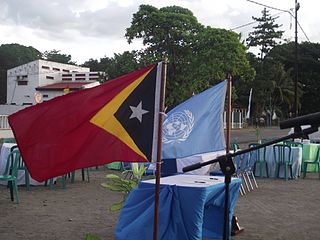
East Timor independence formally occurred on 20 May 2002.
